The Cambridge History of China. Vol. 12: Republican China, 1912-1949, Part 1
Подождите немного. Документ загружается.


THE MAY FOURTH ERA, I 9 I 7-2 7 503
towards a national modernity - to build a new China in a new and better
world of the future. C. T. Hsia's judgment is therefore precisely on
target:
He [the modern Chinese writer] shares with the modern Western writer a vision
of disgust if not despair, but since his vision does not extend beyond China, at
the same time he leaves the door open for hope, for the importation of modern
Western or Soviet systems that would transform his country from its present
state of
decadence.
If he had the courage or insight to equate the Chinese scene
with the condition of modern man, he would have been in the mainstream of
modern literature. But he dared not do so, since to do so would have blotted
out hope for the betterment of
life,
for the restoration of human dignity."
It seems that even the most profound modern Chinese writer - Lu Hsun -
has been unable to transcend this obsession with China.
Lu Hsun's own journey to the left also typified the trend of literary
politicization which began in the late 1920s. This further 'outward' drift
eventually led to an end of subjectivism and individualism. Thus in
historical hindsight, it can be said that the May Fourth era marked an
unparalleled height in the development of these two varieties of the mod-
ern temper. At its best, May Fourth literature conveys a mode of mental
conflict and agony perhaps even sharper than its Western counterparts,
in the sense that the threat of outside reality did not retreat from the
writer's consciousness but remained: the problem posed by a stagnant,
philistine society intruded upon the writer's conscience with aggravating
force. The modern Chinese writer, unlike his Western contemporary,
could not afford to dismiss 'reality'; the price he paid for his 'patriotic
provinciality' was, therefore, a deepened sense of spiritual torment which
carries the 'realistic' force of imminent crisis. From a less aesthetic point
of view, the quest for modernity in Chinese literature yielded a tragically
human meaning. It never became 'inverted' to the
cul-de-sac
of 'pure
aestheticism'. Nor was it confronted with the self-defeatist dilemma in
which Western modernism defines
itself:
obsessed with the impermanence
of time, modernism can never succeed, for if it does, it, too, becomes
'old', thereby ceasing to be modern. In Irving Howe's subtle summation,
'modernism must always struggle but never quite triumph, and then,
after a time, must struggle in order not to triumph.''
8
In his search for the 'betterment of life' and the 'restoration of human
dignity' to himself and his country, the modern Chinese writer kept on
hoping for a bright future as he agonized over the gloomy reality of
worsening social crisis. This conflict between ideal and reality provided
97 Hsia,
A
history, 536.
98
Howe, The idea
of
the modern,
13.
Cambridge Histories Online © Cambridge University Press, 2008
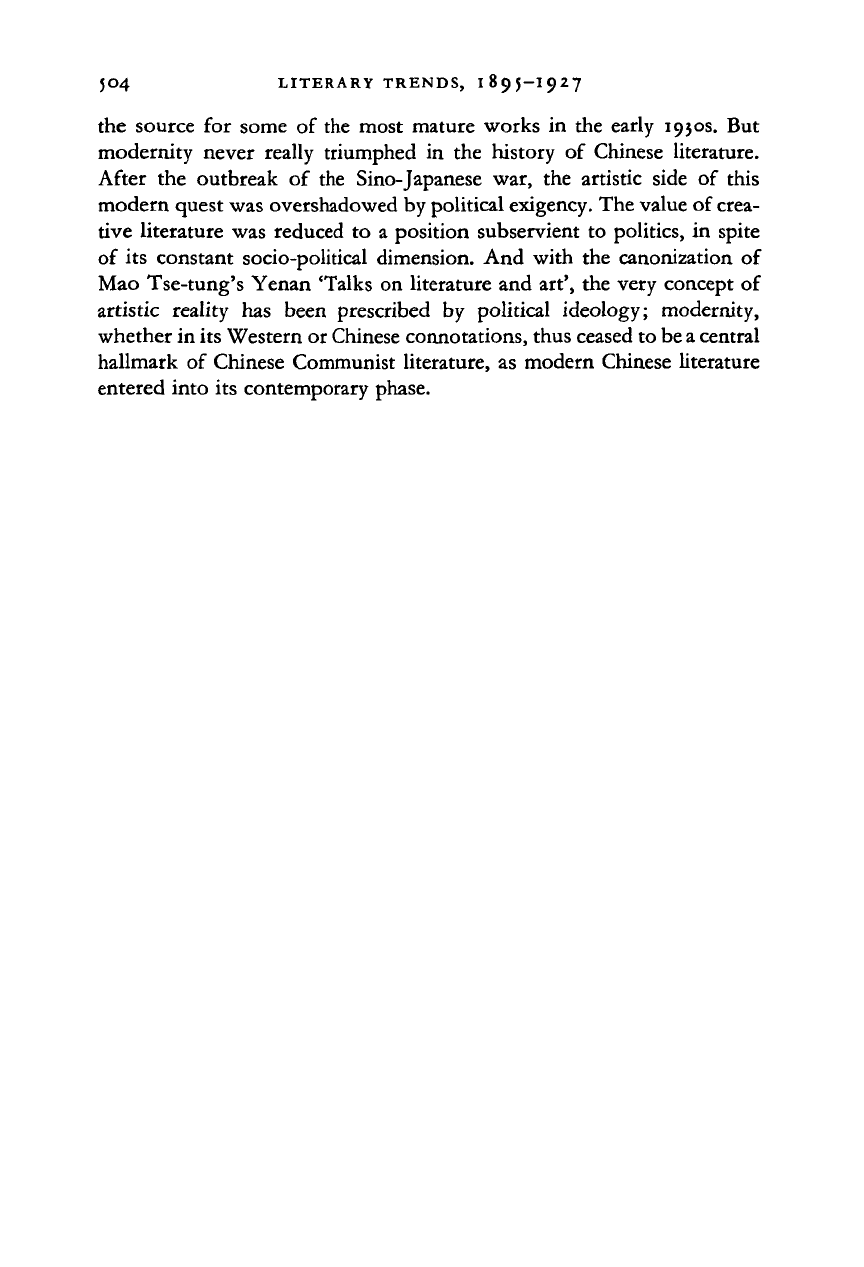
504 LITERARY TRENDS, 1895-I927
the source for some of the most mature works in the early 1930s. But
modernity never really triumphed in the history of Chinese literature.
After the outbreak of the Sino-Japanese war, the artistic side of this
modern quest was overshadowed by political exigency. The value of crea-
tive literature was reduced to a position subservient to politics, in spite
of its constant socio-political dimension. And with the canonization of
Mao Tse-tung's Yenan 'Talks on literature and art', the very concept of
artistic reality has been prescribed by political ideology, modernity,
whether in its Western or Chinese connotations, thus ceased to be
a
central
hallmark of Chinese Communist literature, as modern Chinese literature
entered into its contemporary phase.
Cambridge Histories Online © Cambridge University Press, 2008
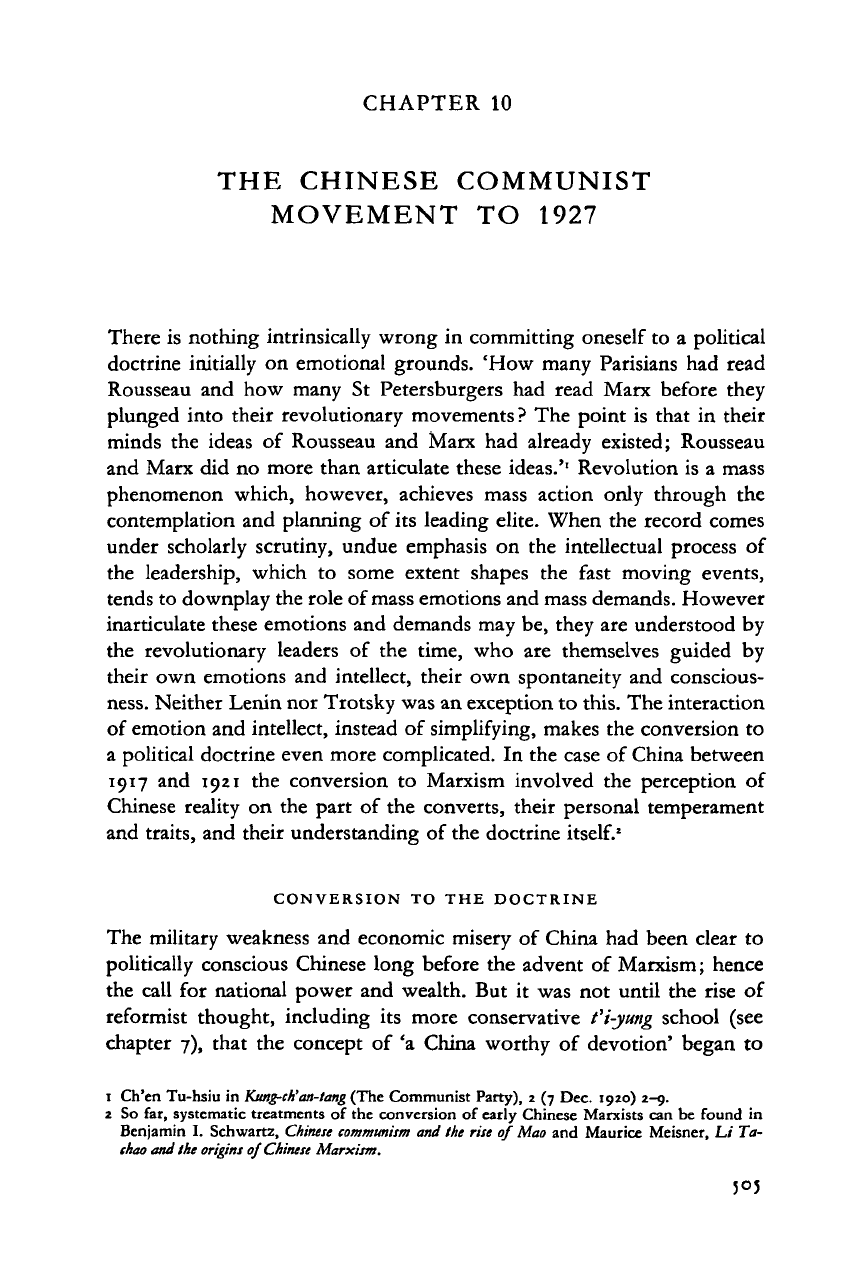
CHAPTER 10
THE CHINESE COMMUNIST
MOVEMENT TO 1927
There is nothing intrinsically wrong in committing oneself to a political
doctrine initially on emotional grounds. 'How many Parisians had read
Rousseau and how many St Petersburgers had read Marx before they
plunged into their revolutionary movements? The point is that in their
minds the ideas of Rousseau and Marx had already existed; Rousseau
and Marx did no more than articulate these ideas.'
1
Revolution is a mass
phenomenon which, however, achieves mass action only through the
contemplation and planning of its leading elite. When the record comes
under scholarly scrutiny, undue emphasis on the intellectual process of
the leadership, which to some extent shapes the fast moving events,
tends to downplay the role of
mass
emotions and mass demands. However
inarticulate these emotions and demands may be, they are understood by
the revolutionary leaders of the time, who are themselves guided by
their own emotions and intellect, their own spontaneity and conscious-
ness.
Neither Lenin nor Trotsky was an exception to this. The interaction
of emotion and intellect, instead of simplifying, makes the conversion to
a political doctrine even more complicated. In the case of China between
1917 and 1921 the conversion to Marxism involved the perception of
Chinese reality on the part of the converts, their personal temperament
and traits, and their understanding of the doctrine
itself.
1
CONVERSION TO THE DOCTRINE
The military weakness and economic misery of China had been clear to
politically conscious Chinese long before the advent of Marxism; hence
the call for national power and wealth. But it was not until the rise of
reformist thought, including its more conservative t'i-jung school (see
chapter 7), that the concept of 'a China worthy of devotion' began to
1 Ch'en Tu-hsiu in
Kung-ch'an-tang
(The Communist Party), 2 (7 Dec. 1920) 2-9.
2 So far, systematic treatments of the conversion of early Chinese Marxists can be found in
Benjamin I. Schwartz,
Chinese communism
and the rise of Mao and Maurice Meisner, Li Ta-
chao and the origins of Chinese Marxism.
5°5
Cambridge Histories Online © Cambridge University Press, 2008
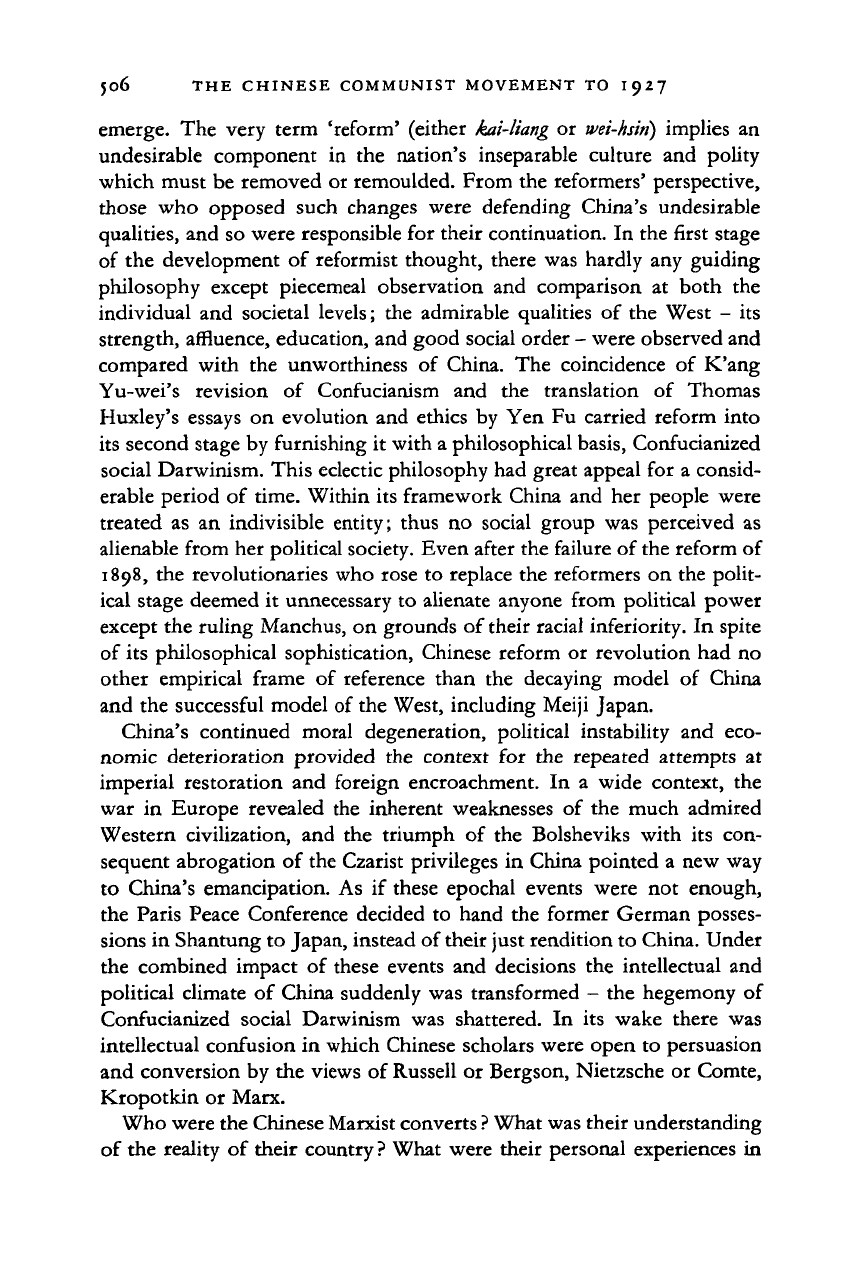
506 THE CHINESE COMMUNIST MOVEMENT TO 1927
emerge. The very term 'reform' (either
kai-liang
or
wei-hsiri)
implies an
undesirable component in the nation's inseparable culture and polity
which must be removed or remoulded. From the reformers' perspective,
those who opposed such changes were defending China's undesirable
qualities, and so were responsible for their continuation. In the first stage
of the development of reformist thought, there was hardly any guiding
philosophy except piecemeal observation and comparison at both the
individual and societal levels; the admirable qualities of the West - its
strength, affluence, education, and good social order - were observed and
compared with the unworthiness of China. The coincidence of K'ang
Yu-wei's revision of Confucianism and the translation of Thomas
Huxley's essays on evolution and ethics by Yen Fu carried reform into
its second stage by furnishing it with a philosophical basis, Confucianized
social Darwinism. This eclectic philosophy had great appeal for a consid-
erable period of time. Within its framework China and her people were
treated as an indivisible entity; thus no social group was perceived as
alienable from her political society. Even after the failure of the reform of
1898,
the revolutionaries who rose to replace the reformers on the polit-
ical stage deemed it unnecessary to alienate anyone from political power
except the ruling Manchus, on grounds of their racial inferiority. In spite
of its philosophical sophistication, Chinese reform or revolution had no
other empirical frame of reference than the decaying model of China
and the successful model of the West, including Meiji Japan.
China's continued moral degeneration, political instability and eco-
nomic deterioration provided the context for the repeated attempts at
imperial restoration and foreign encroachment. In a wide context, the
war in Europe revealed the inherent weaknesses of the much admired
Western civilization, and the triumph of the Bolsheviks with its con-
sequent abrogation of the Czarist privileges in China pointed a new way
to China's emancipation. As if these epochal events were not enough,
the Paris Peace Conference decided to hand the former German posses-
sions in Shantung to Japan, instead of their just rendition to China. Under
the combined impact of these events and decisions the intellectual and
political climate of China suddenly was transformed - the hegemony of
Confucianized social Darwinism was shattered. In its wake there was
intellectual confusion in which Chinese scholars were open to persuasion
and conversion by the views of Russell or Bergson, Nietzsche or Comte,
Kropotkin or Marx.
Who were the Chinese Marxist converts
?
What was their understanding
of the reality of their country
?
What were their personal experiences in
Cambridge Histories Online © Cambridge University Press, 2008
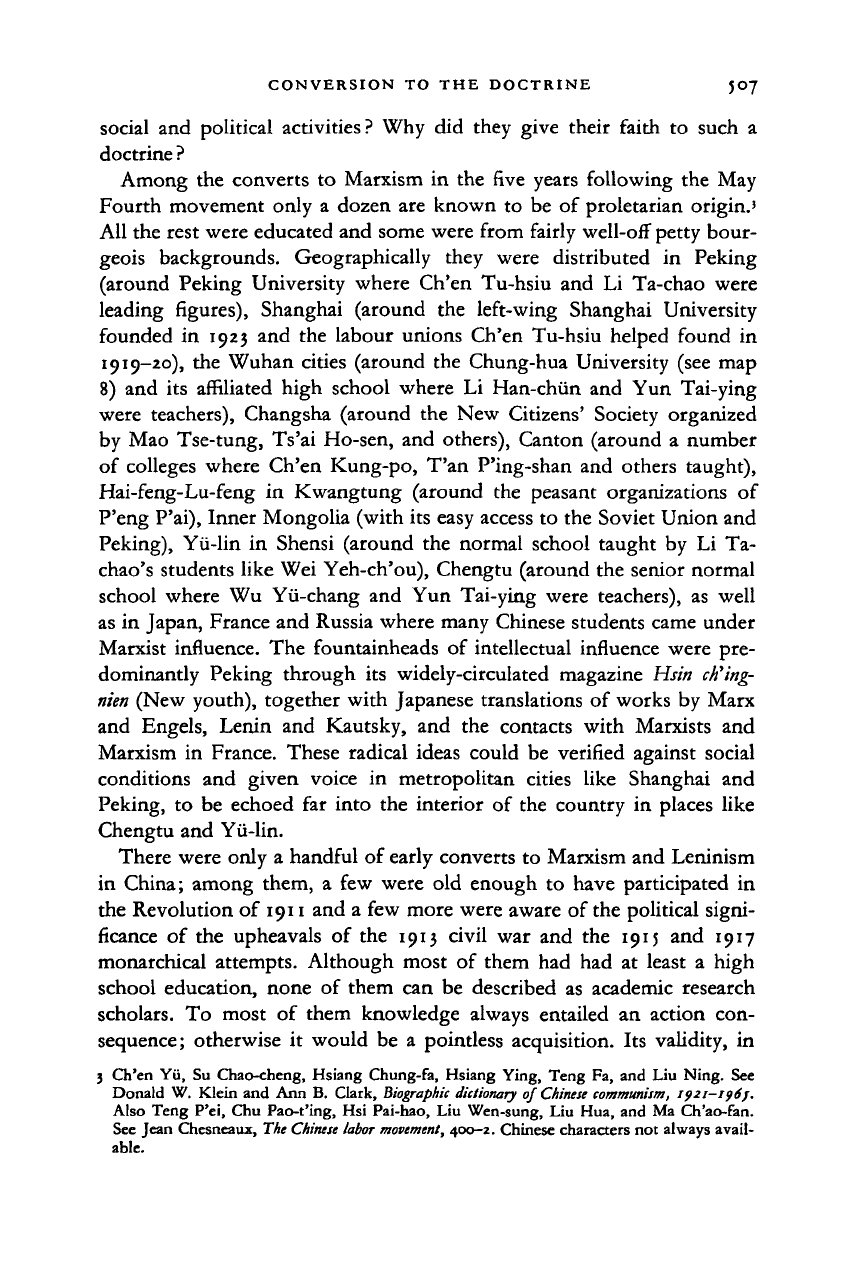
CONVERSION TO THE DOCTRINE 507
social and political activities? Why did they give their faith to such a
doctrine
?
Among the converts to Marxism in the five years following the May
Fourth movement only a dozen are known to be of proletarian origin.'
All the rest were educated and some were from fairly well-off petty bour-
geois backgrounds. Geographically they were distributed in Peking
(around Peking University where Ch'en Tu-hsiu and Li Ta-chao were
leading figures), Shanghai (around the left-wing Shanghai University
founded in 1923 and the labour unions Ch'en Tu-hsiu helped found in
1919-20), the Wuhan cities (around the Chung-hua University (see map
8) and its affiliated high school where Li Han-chun and Yun Tai-ying
were teachers), Changsha (around the New Citizens' Society organized
by Mao Tse-tung, Ts'ai Ho-sen, and others), Canton (around a number
of colleges where Ch'en Kung-po, T'an P'ing-shan and others taught),
Hai-feng-Lu-feng in Kwangtung (around the peasant organizations of
P'eng P'ai), Inner Mongolia (with its easy access to the Soviet Union and
Peking), Yii-lin in Shensi (around the normal school taught by Li Ta-
chao's students like Wei Yeh-ch'ou), Chengtu (around the senior normal
school where Wu Yii-chang and Yun Tai-ying were teachers), as well
as in Japan, France and Russia where many Chinese students came under
Marxist influence. The fountainheads of intellectual influence were pre-
dominantly Peking through its widely-circulated magazine Hsin
ch'ing-
nien
(New youth), together with Japanese translations of works by Marx
and Engels, Lenin and Kautsky, and the contacts with Marxists and
Marxism in France. These radical ideas could be verified against social
conditions and given voice in metropolitan cities like Shanghai and
Peking, to be echoed far into the interior of the country in places like
Chengtu and Yii-lin.
There were only a handful of early converts to Marxism and Leninism
in China; among them, a few were old enough to have participated in
the Revolution of 1911 and a few more were aware of the political signi-
ficance of the upheavals of the 1913 civil war and the 1915 and 1917
monarchical attempts. Although most of them had had at least a high
school education, none of them can be described as academic research
scholars. To most of them knowledge always entailed an action con-
sequence; otherwise it would be a pointless acquisition. Its validity, in
3 Ch'en Yii, Su Chao-cheng, Hsiang Chung-fa, Hsiang Ying, Teng Fa, and Liu Ning. See
Donald W. Klein and Ann B. Clark,
biographic dictionary
of
Chinese
communism,
1921-1)6/.
Also Teng P'ei, Chu Pao-t'ing, Hsi Pai-hao, Liu Wen-sung, Liu Hua, and Ma Ch'ao-fan.
See Jean Chesneaux,
The Chinese
labor
movement,
400-2. Chinese characters not always avail-
able.
Cambridge Histories Online © Cambridge University Press, 2008
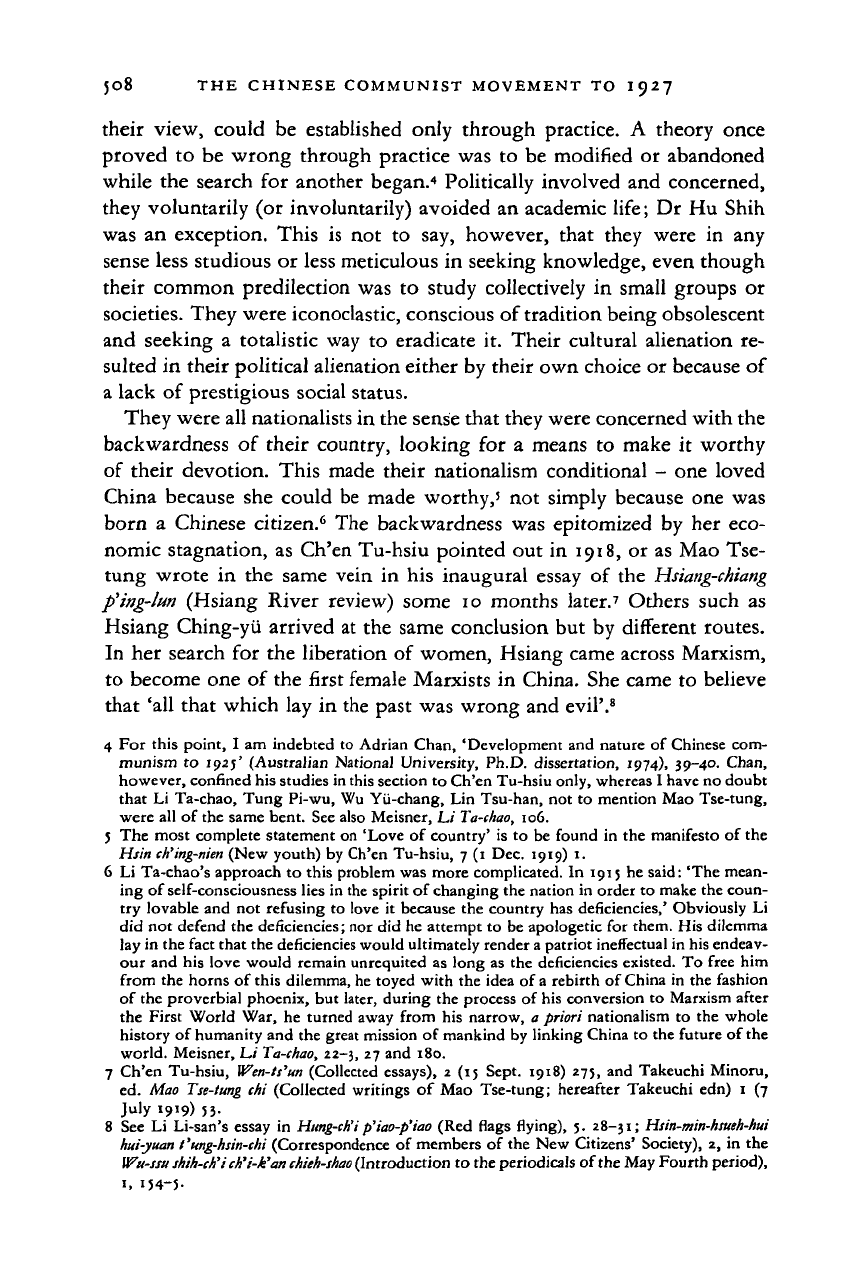
JO8 THE CHINESE COMMUNIST MOVEMENT TO I927
their view, could be established only through practice. A theory once
proved to be wrong through practice was to be modified or abandoned
while the search for another began.
4
Politically involved and concerned,
they voluntarily (or involuntarily) avoided an academic life; Dr Hu Shih
was an exception. This is not to say, however, that they were in any
sense less studious or less meticulous in seeking knowledge, even though
their common predilection was to study collectively in small groups or
societies. They were iconoclastic, conscious of tradition being obsolescent
and seeking a totalistic way to eradicate it. Their cultural alienation re-
sulted in their political alienation either by their own choice or because of
a lack of prestigious social status.
They were all nationalists in the sense that they were concerned with the
backwardness of their country, looking for a means to make it worthy
of their devotion. This made their nationalism conditional - one loved
China because she could be made worthy,' not simply because one was
born a Chinese citizen.
6
The backwardness was epitomized by her eco-
nomic stagnation, as Ch'en Tu-hsiu pointed out in 1918, or as Mao Tse-
tung wrote in the same vein in his inaugural essay of the
Hsiang-chiang
p'ing-lun
(Hsiang River review) some 10 months later.
7
Others such as
Hsiang Ching-yii arrived at the same conclusion but by different routes.
In her search for the liberation of women, Hsiang came across Marxism,
to become one of the first female Marxists in China. She came to believe
that 'all that which lay in the past was wrong and evil'.
8
4 For this point, I am indebted to Adrian Chan, 'Development and nature of Chinese com-
munism to 1925' (Australian National University, Ph.D. dissertation, 1974), 39-40- Chan,
however, confined his studies in this section to Ch en Tu-hsiu only, whereas I have no doubt
that Li Ta-chao, Tung Pi-wu, Wu Yii-chang, Lin Tsu-han, not to mention Mao Tse-tung,
were all of the same bent. See also Meisner, Li
Ta-chao,
106.
5 The most complete statement on 'Love of country' is to be found in the manifesto of the
Hsin
ch'ing-nien
(New youth) by Ch'en Tu-hsiu, 7 (1 Dec. 1919) 1.
6 Li Ta-chao's approach to this problem was more complicated. In 1915 he said: 'The mean-
ing of self-consciousness lies in the spirit of changing the nation in order to make the coun-
try lovable and not refusing to love it because the country has deficiencies,' Obviously Li
did not defend the deficiencies; nor did he attempt to be apologetic for them. His dilemma
lay in the fact that the deficiencies would ultimately render a patriot ineffectual in his endeav-
our and his love would remain unrequited as long as the deficiencies existed. To free him
from the horns of this dilemma, he toyed with the idea of
a
rebirth of China in the fashion
of the proverbial phoenix, but later, during the process of his conversion to Marxism after
the First World War, he turned away from his narrow, a
priori
nationalism to the whole
history of humanity and the great mission of mankind by linking China to the future of the
world. Meisner, Li
Ta-chao,
22-3, 27 and 180.
7 Ch'en Tu-hsiu,
Wen-ts'un
(Collected essays), 2 (15 Sept. 1918) 275, and Takeuchi Minoru,
ed. Mao
Tse-tung
chi (Collected writings of Mao Tse-tung; hereafter Takeuchi edn) 1 (7
July 1919) 53.
8 See Li Li-san's essay in
Himg-ch'i
p'iao-p'iao
(Red flags flying), 5.
28-31;
Hsin-min-hsueh-hui
hut-yuan
t'
ung-hsin-chi
(Correspondence of members of the New Citizens' Society), 2, in the
Wu-ssu
shih-ch'i
ch'i-k'an Meh-shao
(Introduction to the periodicals of the May Fourth period),
1,
154-5-
Cambridge Histories Online © Cambridge University Press, 2008
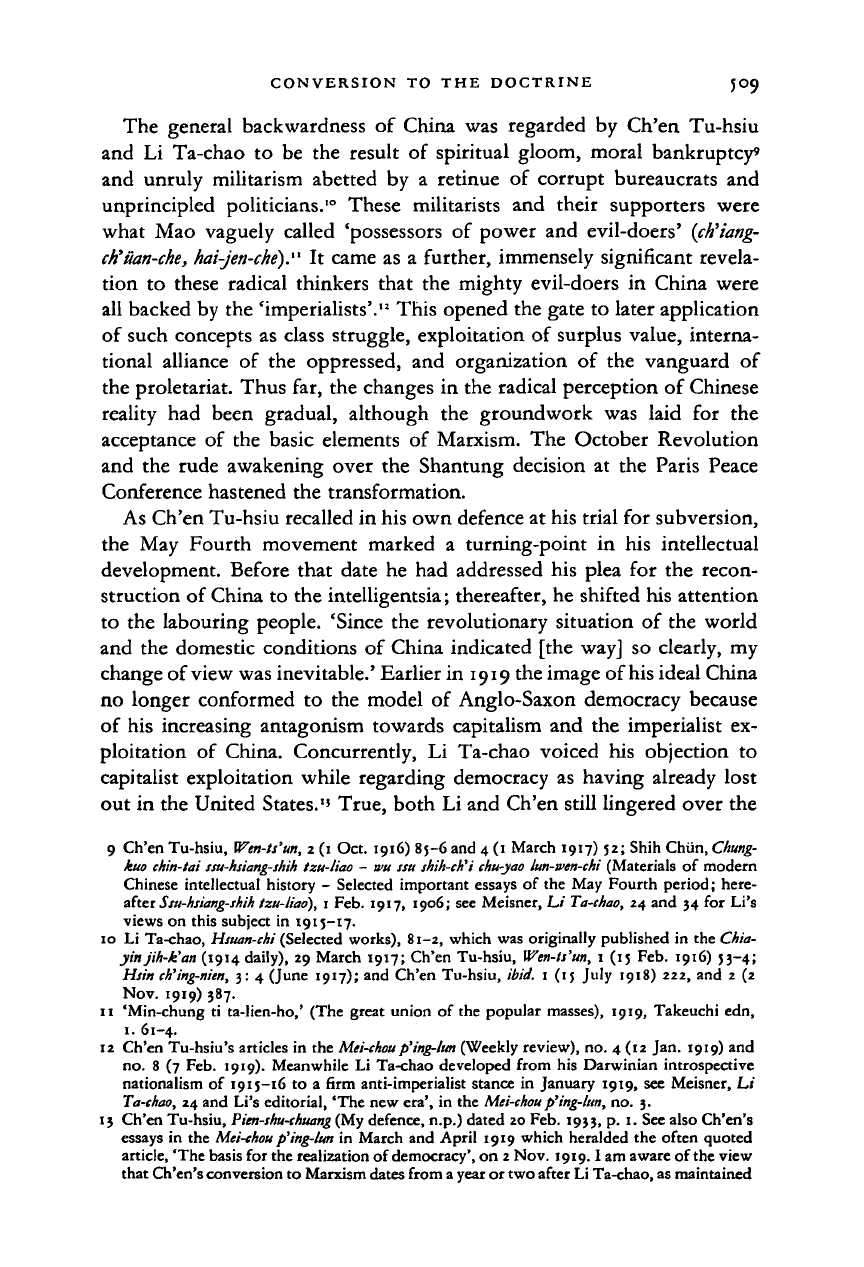
CONVERSION TO THE DOCTRINE 509
The general backwardness of China was regarded by Ch'en Tu-hsiu
and Li Ta-chao to be the result of spiritual gloom, moral bankruptcy
9
and unruly militarism abetted by a retinue of corrupt bureaucrats and
unprincipled politicians.
10
These militarists and their supporters were
what Mao vaguely called 'possessors of power and evil-doers'
(ch'iang-
ch'uan-che,
hai-jen-che)."
It came as a further, immensely significant revela-
tion to these radical thinkers that the mighty evil-doers in China were
all backed by the 'imperialists'.
12
This opened the gate to later application
of such concepts as class struggle, exploitation of surplus value, interna-
tional alliance of the oppressed, and organization of the vanguard of
the proletariat. Thus far, the changes in the radical perception of Chinese
reality had been gradual, although the groundwork was laid for the
acceptance of the basic elements of Marxism. The October Revolution
and the rude awakening over the Shantung decision at the Paris Peace
Conference hastened the transformation.
As Ch'en Tu-hsiu recalled in his own defence at his trial for subversion,
the May Fourth movement marked a turning-point in his intellectual
development. Before that date he had addressed his plea for the recon-
struction of China to the intelligentsia; thereafter, he shifted his attention
to the labouring people. 'Since the revolutionary situation of the world
and the domestic conditions of China indicated [the way] so clearly, my
change of view was inevitable.' Earlier in 1919 the image of his ideal China
no longer conformed to the model of Anglo-Saxon democracy because
of his increasing antagonism towards capitalism and the imperialist ex-
ploitation of China. Concurrently, Li Ta-chao voiced his objection to
capitalist exploitation while regarding democracy as having already lost
out in the United States.
1
' True, both Li and Ch'en still lingered over the
9 Ch'en Tu-hsiu,
Wen-ts'un,
2 (1 Oct. 1916) 85-6 and 4 (1 March 1917) 52; Shih Chun,
Chung-
kuo chin-tai ssu-hsiang-shih tzu-liao - wu ssu shih-ch'i chu-yao lun-wen-chi (Materials of modern
Chinese intellectual history - Selected important essays of the May Fourth period; here-
after
Ssu-hsiang-shih
tzu-liao), i Feb. 1917, 1906; see Meisner, U
Ta-chao,
24 and 34 for Li's
views on this subject in 1915-17.
10 Li Ta-chao,
Hsuan-chi
(Selected works), 81-2, which was originally published in the Chia-
yinjih-k'an (1914 daily), 29 March 1917; Ch'en Tu-hsiu, Wen-ts'un, 1 (15 Feb. 1916) 53-4;
Hsin
ch'ing-nien,
3: 4 (June 1917); and Ch'en Tu-hsiu,
ibid.
1 (15 July 1918) 222, and 2 (2
Nov. 1919) 387.
11 'Min-chung ti ta-lien-ho,' (The great union of the popular masses), 1919, Takeuchi edn,
1.
61-4.
12 Ch'en Tu-hsiu's articles in the
Mii-chou
p'ing-lun
(Weekly review), no. 4 (12 Jan. 1919) and
no.
8 (7 Feb. 1919). Meanwhile Li Ta-chao developed from his Darwinian introspective
nationalism of 1915-16 to a firm anti-imperialist stance in January 1919, see Meisner, Li
Ta-chao,
24 and Li's editorial, "The new era', in the
Mei-chou
p'ing-hm,
no. 3.
13 Ch'en Tu-hsiu,
Pien-shu-chuang
(My defence, n.p.) dated 20 Feb. 1933, p. 1. See also Ch'en's
essays in the
Mei-ehou
p'ing-lun
in March and April 1919 which heralded the often quoted
article, 'The basis for the realization of democracy', on 2 Nov. 1919.1 am aware of the view
that Ch'en's conversion to Marxism dates from a year or two after Li Ta-chao, as maintained
Cambridge Histories Online © Cambridge University Press, 2008
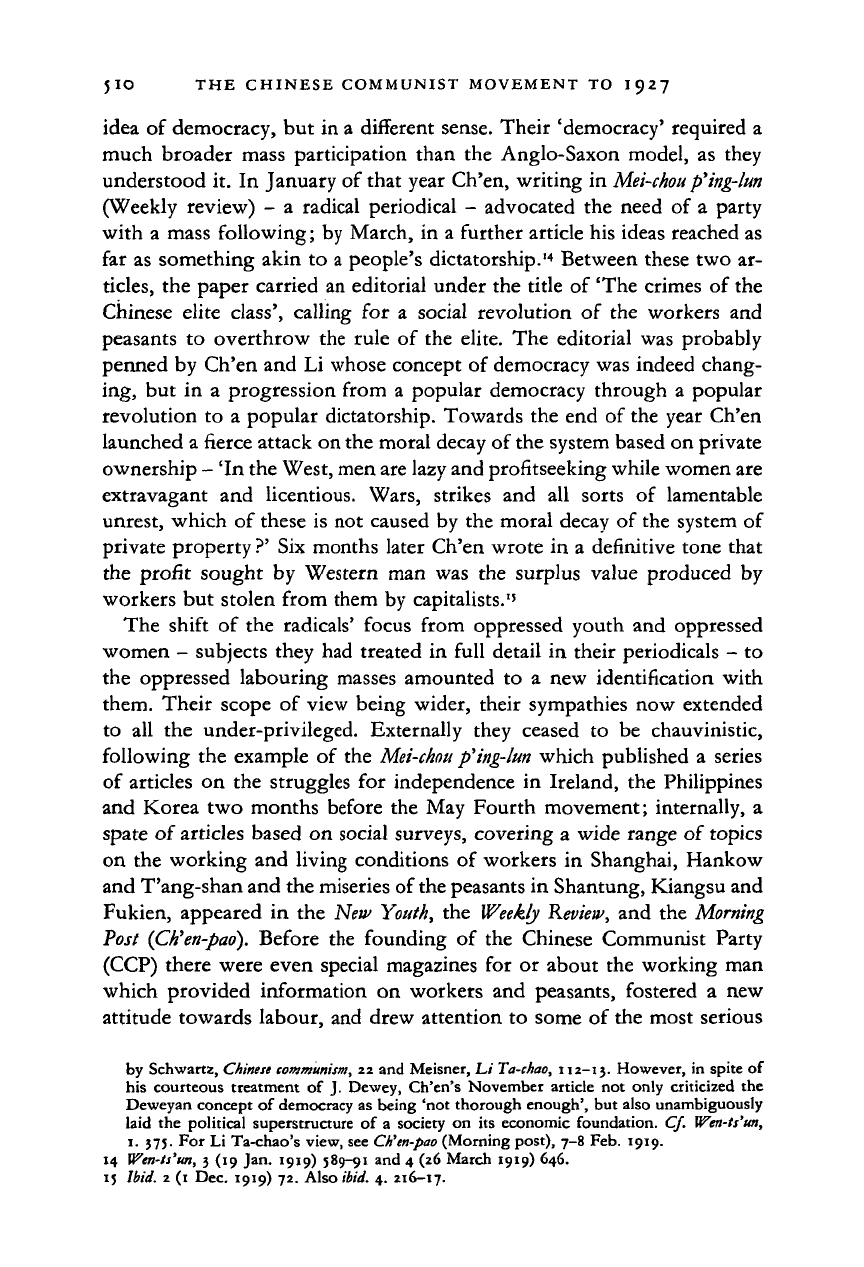
5IO THE CHINESE COMMUNIST MOVEMENT TO 1927
idea of democracy, but in a different sense. Their 'democracy' required a
much broader mass participation than the Anglo-Saxon model, as they
understood it. In January of that year Ch'en, writing in
Mei-chou
p'ing-lun
(Weekly review) - a radical periodical - advocated the need of a party
with a mass following; by March, in a further article his ideas reached as
far as something akin to a people's dictatorship.'
4
Between these two ar-
ticles,
the paper carried an editorial under the title of 'The crimes of the
Chinese elite class', calling for a social revolution of the workers and
peasants to overthrow the rule of the elite. The editorial was probably
penned by Ch'en and Li whose concept of democracy was indeed chang-
ing, but in a progression from a popular democracy through a popular
revolution to a popular dictatorship. Towards the end of the year Ch'en
launched a fierce attack on the moral decay of the system based on private
ownership
—
'In the West, men are lazy and profitseeking while women are
extravagant and licentious. Wars, strikes and all sorts of lamentable
unrest, which of these is not caused by the moral decay of the system of
private property ?' Six months later Ch'en wrote in a definitive tone that
the profit sought by Western man was the surplus value produced by
workers but stolen from them by capitalists.
15
The shift of the radicals' focus from oppressed youth and oppressed
women - subjects they had treated in full detail in their periodicals - to
the oppressed labouring masses amounted to a new identification with
them. Their scope of view being wider, their sympathies now extended
to all the under-privileged. Externally they ceased to be chauvinistic,
following the example of the
Mei-chou
p'ing-lun
which published a series
of articles on the struggles for independence in Ireland, the Philippines
and Korea two months before the May Fourth movement; internally, a
spate of articles based on social surveys, covering a wide range of topics
on the working and living conditions of workers in Shanghai, Hankow
and T'ang-shan and the miseries of the peasants in Shantung, Kiangsu and
Fukien, appeared in the New Youth, the Weekly
Review,
and the
Morning
Post
(Ch'en-pao).
Before the founding of the Chinese Communist Party
(CCP) there were even special magazines for or about the working man
which provided information on workers and peasants, fostered a new
attitude towards labour, and drew attention to some of the most serious
by Schwartz,
Chinese
communism,
22 and Meisner, Li
Ta-chao,
112-13. However, in spite of
his courteous treatment of J. Dewey, Ch'en's November article not only criticized the
Deweyan concept of democracy as being 'not thorough enough', but also unambiguously
laid the political superstructure of a society on its economic foundation. Cf. Wen-ts'tm,
1.
375. For Li Ta-chao's view, see
Ch'en-pao
(Morning post), 7-8 Feb. 1919.
14 Wen-ts'un, 3 (19 Jan. 1919) 589-91 and 4 (26 March 1919) 646.
15
Ibid.
2 (1 Dec. 1919) 72. Also
ibid.
4. 216-17.
Cambridge Histories Online © Cambridge University Press, 2008
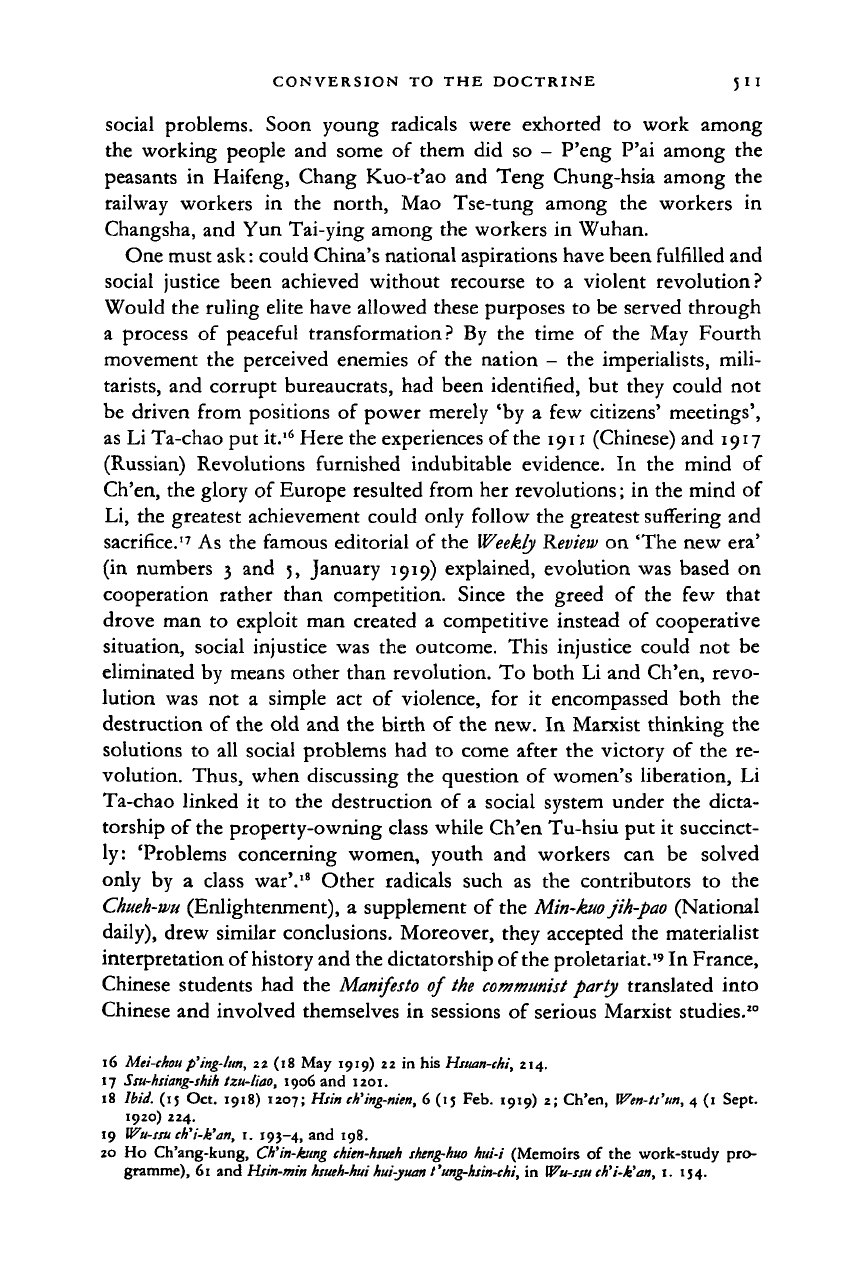
CONVERSION TO THE DOCTRINE
J
I I
social problems. Soon young radicals were exhorted to work among
the working people and some of them did so - P'eng P'ai among the
peasants in Haifeng, Chang Kuo-t'ao and Teng Chung-hsia among the
railway workers in the north, Mao Tse-tung among the workers in
Changsha, and Yun Tai-ying among the workers in Wuhan.
One must ask: could China's national aspirations have been fulfilled and
social justice been achieved without recourse to a violent revolution?
Would the ruling elite have allowed these purposes to be served through
a process of peaceful transformation? By the time of the May Fourth
movement the perceived enemies of the nation - the imperialists, mili-
tarists, and corrupt bureaucrats, had been identified, but they could not
be driven from positions of power merely 'by a few citizens' meetings',
as Li Ta-chao put it.'
6
Here the experiences of the 1911 (Chinese) and 1917
(Russian) Revolutions furnished indubitable evidence. In the mind of
Ch'en, the glory of Europe resulted from her revolutions; in the mind of
Li,
the greatest achievement could only follow the greatest suffering and
sacrifice.
17
As the famous editorial of the
Weekly Review
on 'The new era'
(in numbers 3 and 5, January 1919) explained, evolution was based on
cooperation rather than competition. Since the greed of the few that
drove man to exploit man created a competitive instead of cooperative
situation, social injustice was the outcome. This injustice could not be
eliminated by means other than revolution. To both Li and Ch'en, revo-
lution was not a simple act of violence, for it encompassed both the
destruction of the old and the birth of the new. In Marxist thinking the
solutions to all social problems had to come after the victory of the re-
volution. Thus, when discussing the question of women's liberation, Li
Ta-chao linked it to the destruction of a social system under the dicta-
torship of the property-owning class while Ch'en Tu-hsiu put it succinct-
ly: 'Problems concerning women, youth and workers can be solved
only by a class war'.'
8
Other radicals such as the contributors to the
Chueh-wu
(Enlightenment), a supplement of the Min-kuo jih-pao (National
daily),
drew similar conclusions. Moreover, they accepted the materialist
interpretation of history and the dictatorship of the proletariat.
19
In France,
Chinese students had the
Manifesto
of
the communist
party translated into
Chinese and involved themselves in sessions of serious Marxist studies.
10
16 Mei-choup'ing-lun, 22 (18 May 1919) 22 in his Hsuan-chi, 214.
17 Ssu-hsiang-shih tzu-liao, 1906 and 1201.
18
Ibid.
(15 Oct. 1918) 1207; Hsin ch'ing-nien, 6(15 Feb. 1919) 2; Ch'en, Wen-ts'un, 4 (1 Sept.
1920) 224.
19 Wu-tsuch'i-k'an, 1. 193-4, and 198.
20 Ho Ch'ang-kung,
Ch'in-kung chien-hsuth shtng-huo
hni-i (Memoirs of the work-study pro-
gramme), 61 and
Hsin-min hsueh-hui hui-yuan
t'ung-hiin-chi,
in
Wu-ssu
ch'i-k'an,
1. 154.
Cambridge Histories Online © Cambridge University Press, 2008

JI2 THE CHINESE COMMUNIST MOVEMENT TO I927
It was through the influence of one of these students, Ts'ai Ho-sen, that
Mao Tse-tung exchanged his earlier admiration for Kropotkin for that of
Marx.
21
The emotional defiance in all these cases of personal transforma-
tion was apparent. Without it they would not have been fervent revolu-
tionaries, as they were to be.
But why Marxism
?
What did the radicals know about it before taking
the plunge into organized political action
?
Prior to the founding of the
CCP several translations of the
Communist manifesto
were available; there
were also essays introducing historical materialism in the New Youth and
the supplement of the
Morning
Post (by Kawakami Hajime). Kautsky's
Karl Marx's
okonomische
Lehren received two translations, one by the
Kuomintang (KMT) theorist, Tai Chi-t'ao, but Das Kapital itself was
available in Chinese only in drastically abridged forms. Also in Chinese
were Wages, labour and capital; Critique of the
Gotha
programme; Civil war in
France; On the Jewish
question;
The
holy
family; The poverty of philosophy; A
contribution to the critique of political
economy;
and Socialism:
Utopian
and
scien-
tific. In the library of Peking University there was a considerable collec-
tion of communist literature in English, German, French and Japanese
which Li Ta-chao used in the discussions with his group of socialist
youths. Apart from these, the October Revolution naturally drew the
attention of the radicals to Russia under the Bolshevik leaders. Lenin's
State and
revolution,
Imperialism: the highest stage of
capitalism,
and heft-wing
communism: an infantile disorder; and Trotsky's Communism and terrorism
and
Bolshevism
and
world peace
were translated into Chinese. The Chinese
version of Lenin's report on the constitution of the Communist Party of
the Soviet Union at the party's Eighth Congress in December 1919 found
space in the New Youth (volume 8, numbers 3 and 4) in two instalments -
'National self-determination' and 'The economy in the period of transi-
tion'. The work of introducing Marxism-Leninism gained momentum
with the founding of the monthly,
Kung-ch'an-tang
(The communist party),
in Shanghai in November 1920 while various aspects of the party, state
and society of Russia, together with Russia's new arts and literature were
reported in several radical periodicals." Not satisfied with the translated
reports on the new Russia, Chinese either went to Russia for first-hand
observation or sent correspondents to reside in Moscow. Among them
was Ch'ii Ch'iu-pai whose motive was 'to search for the key to China's
zi Takeuchi edn, i. 58 and Hsin-min
hsueh-hui hui-yuan
t'ung-hsin-chi, 3 quoted in the Hu-ium
li-shih tzu-liao (Historical materials of Hunan), 4 (19)9) 80.
22 The best sources on this subject are Wu-ssu ch'i-k'an, vols. 1 and 3; Chang Ching-lu,
Chung-
kuo chin-tai ch'u-pan shih-liao (Historical materials on modern Chinese publications), pt 1,
68 and 75; an advertisement in Hsm
ch'ing-nicn,
9 (1 Sept. 1921) 5; and Chin-tai-shih tzu-liao
(Materials of modern history), 2 (1955) 161-73.
Cambridge Histories Online © Cambridge University Press, 2008
